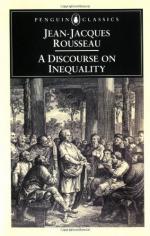
|
| Name: _________________________ | Period: ___________________ |
This quiz consists of 5 multiple choice and 5 short answer questions through Chapter 4, A Discourse on the Origin of Inequality, Part One.
Multiple Choice Questions
1. What would history be empty without, according Rousseau?
(a) Without greed and power.
(b) Money.
(c) Government.
(d) Without tyrants or wars.
2. What is much disagreement made over, according to Rousseau in "Chapter 3, A Discourse on the Origin of Inequality, Dedication and Preface"?
(a) The evolution of man.
(b) The nature of man.
(c) The nature of greed.
(d) The evolution of greed.
3. How do modern centuries see natural law?
(a) Rules given to men, given to themselves.
(b) Understood rules.
(c) Rules.
(d) Accepted societal behavior.
4. According to Rousseau, who destroyed human compassion?
(a) Desire.
(b) Greed.
(c) Power.
(d) Modern depravity.
5. What good definition is hard to find, according to Rousseau?
(a) Human greed.
(b) Human law.
(c) Natural greed.
(d) Natural law.
Short Answer Questions
1. What is tragic about an increasing knowledge, according to Rousseau?
2. How does Rousseau want to live and die?
3. What type of rights does Rousseau want the cities in his State to have?
4. Why does Rousseau believe the arts and sciences are responsible for the fall and collapse of human's morality?
5. What type of government worries Rousseau?
|
This section contains 225 words (approx. 1 page at 300 words per page) |

|




